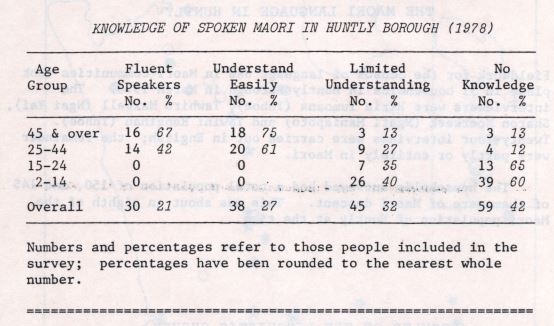-
Ngā Karere me Ngā Rauemi
News and Resources
Ngā Karere me Ngā Rauemi
News and Resources
-
Te Rangaihi Reo Māori
The Movement
Te Rangaihi Reo Māori
The Movement
-
Te Pae Kōrero
Our Community
Te Pae Kōrero
Our Community
-
Huihuinga
Events
Huihuinga
Events
-
Ngā Ara Ako
Learning Pathways
Ngā Ara Ako
Learning Pathways
-
SearchSearch
Search
Search

Many people we interviewed were worried that fewer and fewer people knew and used Maori in Huntly. Some people said that Māori must die out as a language for everyday use in the home and community. This was especially true in towns and cities where English was spoken by nearly everyone and Maori was spoken mainly by elderly people. Television and radio programmes, as well as all reading material, were in English. This was not helping those parents who were trying to teach their children Maori in the home, and many people had simply given up trying. This is why many people wanted the language taught in schools, especially at the primary school level. Some people said that schools should be teaching the local Waikato dialect and not that of any other tribe. Half of the people interviewed said that they had been beaten as children for speaking Maori at school. Many of these people did not teach their own children Maori, partly because they did not want them beaten as they had been.
Waikato | Waikato | 1970-75 | 5% of Māori children can speak te reo. (1970-75) | Story is by tangata whenua
















Comments